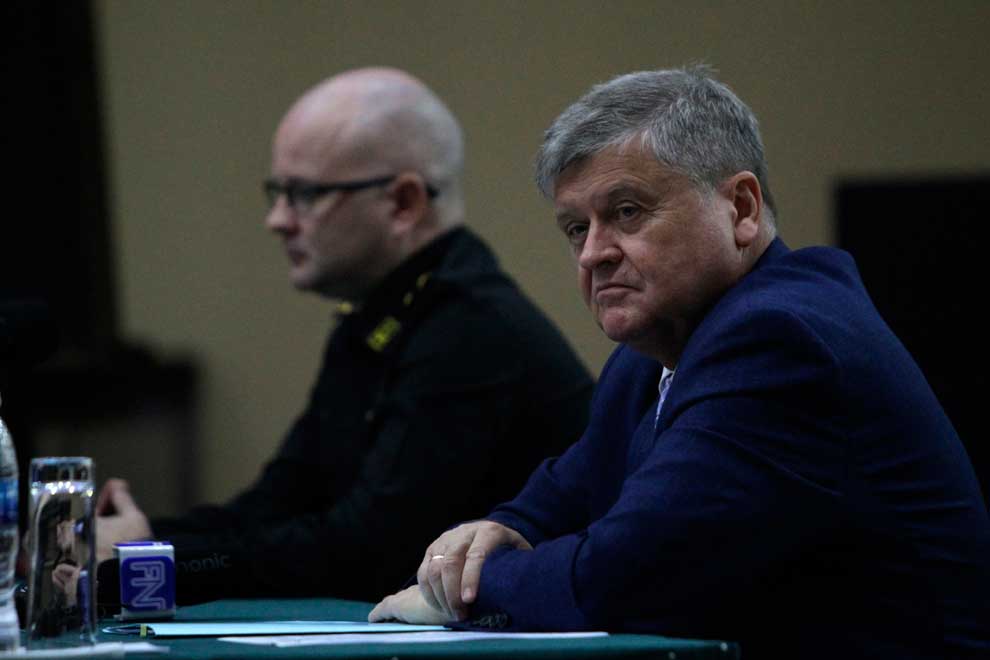
CPP leader Hun Sen and Russia’s United Russia counterpart Dmitry Medvedev in a virtual meeting on January 22. SHS
Former Prime Minister Hun Sen, president of the ruling Cambodian People’s Party (CPP), and former Russian President Dmitry Medvedev, now chairman of the ruling United Russia Party, met for a 20-minute virtual discussion on bilateral and multilateral cooperation on January 22.
The leaders of the two parties spoke highly of their party-to-party relations and close collaboration over the past 25 years, according to a social media post by Hun Sen.
Hun Sen and Medvedev agreed to increase cooperation between their two parties, including through possible exchanges of visits between the leadership of both parties.
Both leaders committed to continued mutual support on international cooperation, mutual interests, and the strengthening of regional and global multilateralism.
“The leaders of both parties saw the necessity of cooperating to combat possible colour revolutions. This is an important point which must be considered, because interference in internal affairs threatens the national security of each country.
“Therefore, it is necessary to be united to prevent interference in internal affairs, through the exchange of experience, wherever possible,” said the post.
At the same time, the Russian side voiced strong support for the leadership of Prime Minister Hun Manet and congratulated him on becoming a CPP vice-president.
The two leaders also agreed to closer cooperation within the National Assembly and Senate frameworks, with the Russian side sharing its belief that if Hun Sen is elected president of the Senate in the coming days, the relationship between the two nations will be enhanced.
Both sides also expressed support for increased mutual cooperation in international forums, as well as agreeing to review past collaboration, while searching for new areas of mutual interest to work together in.
Hun Sen and Medvedev also discussed other fields of bilateral and multilateral cooperation at length.
Kin Phea, director of the International Relations Institute at the Royal Academy of Cambodia, said similar meetings traditionally pave the way for inter-state relations. He noted that Cambodia is a signatory and supporter of the UN resolution condemning the Russian war against Ukraine.
He explained that the meeting also provided them with the opportunity to re-affirm their respective stances on bilateral relations and increased Cambodia-Russia cooperation.
“The relationship between the ruling parties of the two countries is important, because both governments were created by the two parties. Thus, the government traditionally follows the direction of the party,” he said.
“It is obvious that the excellent relationship between the two ruling parties has contributed to fostering ties between the two governments. This is important, as it is likely that both parties will continue to hold power,” he added.
He suggested that while political and economic relations between Cambodia and Russia are not particularly close at the moment, as a world power and an influential member of the UN Security Council, Russia is strategically important to Cambodia.
He also believes that Cambodia should boost energy investment with Russia, wherever possible.
Cambodian Reform Party (CRP) founder Ou Chanrath claimed that the ruling parties of both countries are similar in tendencies. The CPP, he said, has developed a power base to run the country, while its Russian counterpart has constantly increased its influence to gain power.
“As long we carefully weigh up a close relationship with Russia and its ruling party, it will not be problematic. If we are excessively biased toward Russia, we will inevitably receive some criticism from other countries, especially the West. We must be careful to protect the Kingdom’s image on the international stage,” he said.


























